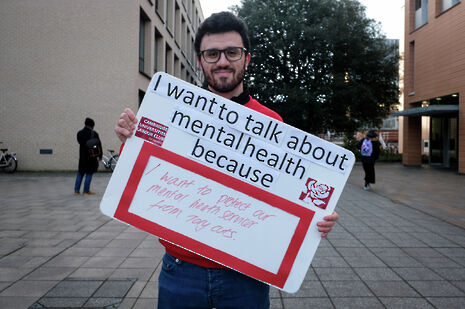Labour Club to lobby University for better intermissions support
Campaigners will push to improve financial support for intermitting students as part of their latest campaign

The Cambridge Universities Labour Club (CULC) will lobby the University to provide better financial support to all intermitting students as part of its latest effort to improve mental health provisions — Let’s Talk About Mental Health.
The campaign, launched this morning, seeks to improve mental health provisions nationally and locally, as well as to spark discussion. In a statement to Varsity, co-chairs Rhiannon Melliar-Smith and Nick Saunders said: mental health provisions “can’t help anyone if people don’t feel that they are able to talk about the problems they’re facing”.
Part of the campaign will be directed at Varsity’s latest findings on intermissions. An investigation last week exposed significant cracks in the Cambridge and government systems for intermitting students, that potentially put them in significant financial difficulties. Speaking to Varsity, Saunders said: “mental health is a big reason why people intermit and we don’t think anyone should be disincentivised from intermitting because of money concerns”.
Commenting on the investigation, Melliar-Smith and Saunders added: “We think that Varsity’s recent investigation was shocking. Intermitting students’ dignity and financial situation must be under the consideration of the university when formulating their policy towards these students, who are valued members of our community. We will certainly be discussing the findings in our campaign.”
At a national level, campaigners will also seek to fight what CULC calls “the detrimental cuts from the Tory government” to mental health provision. In an effort to combat this on a national level, the Labour Club has organised a mental health discussion panel on 9th March, which Cambridge MP Daniel Zeichner is scheduled to attend, to discuss problems which relate to mental health services.
Locally, the campaign plans to help a local mental health charity through fundraising or volunteer work, alongside plans to campaign for local Labour councillors who will fight against Conservative cuts.
A “drop-in day” to help students “relax and cope with any problems” and receive advice on further points of contact or ways to move forward has also been organised.
Melliar-Smith and Saunders said: “Mental health is important to us because Labour should always seek to protect every person in our society, we vehemently fight for the NHS in order to protect people, and we should be doing the same with mental health services.
“The Labour Party isn’t just an organisation seeking to form a government, we’re also a group of people with a shared vision of a fairer and more equal society. We do not see how this is possible without tackling such issues as mental health and ensuring that all, including the most vulnerable members of our society, are protected and valued.”
The campaign comes amidst rising reports of deficient mental health provisions in Cambridge University. In Michaelmas 2017, Varsity reported on failures in the University Counselling Service that had led to waiting times of up to five weeks. An email from a Queens’ Director of Studies received national attention last November for telling students that they are “NOT at any other uni, where students do drink a lot and do have what they regard as a ‘good time’”.
The campaign was officially launched this morning, with members of the group based at Sidgwick Site dressed in red, asking people to write their thoughts on the significance of talking about mental health on whiteboards.
Students were photographed with their messages, including, “I want to talk about mental health because many more people than you think are suffering from mental illness”, and, “I want to talk about mental health because too many people I love have been forced to suffer in silence.”
One person wrote that talking about mental health had “saved their life”. Commenting on the message, Melliar-Smith and Saunders said: “that was definitely a highlight for us – it showed that talking is such an important part of any mental health strategy.”
 Comment / Plastic pubs: the problem with Cambridge alehouses 5 January 2026
Comment / Plastic pubs: the problem with Cambridge alehouses 5 January 2026 News / Cambridge businesses concerned infrastructure delays will hurt growth5 January 2026
News / Cambridge businesses concerned infrastructure delays will hurt growth5 January 2026 News / New movement ‘Cambridge is Chopped’ launched to fight against hate crime7 January 2026
News / New movement ‘Cambridge is Chopped’ launched to fight against hate crime7 January 2026 News / Uni-linked firms rank among Cambridgeshire’s largest7 January 2026
News / Uni-linked firms rank among Cambridgeshire’s largest7 January 2026 News / AstraZeneca sues for £32 million over faulty construction at Cambridge Campus31 December 2025
News / AstraZeneca sues for £32 million over faulty construction at Cambridge Campus31 December 2025









